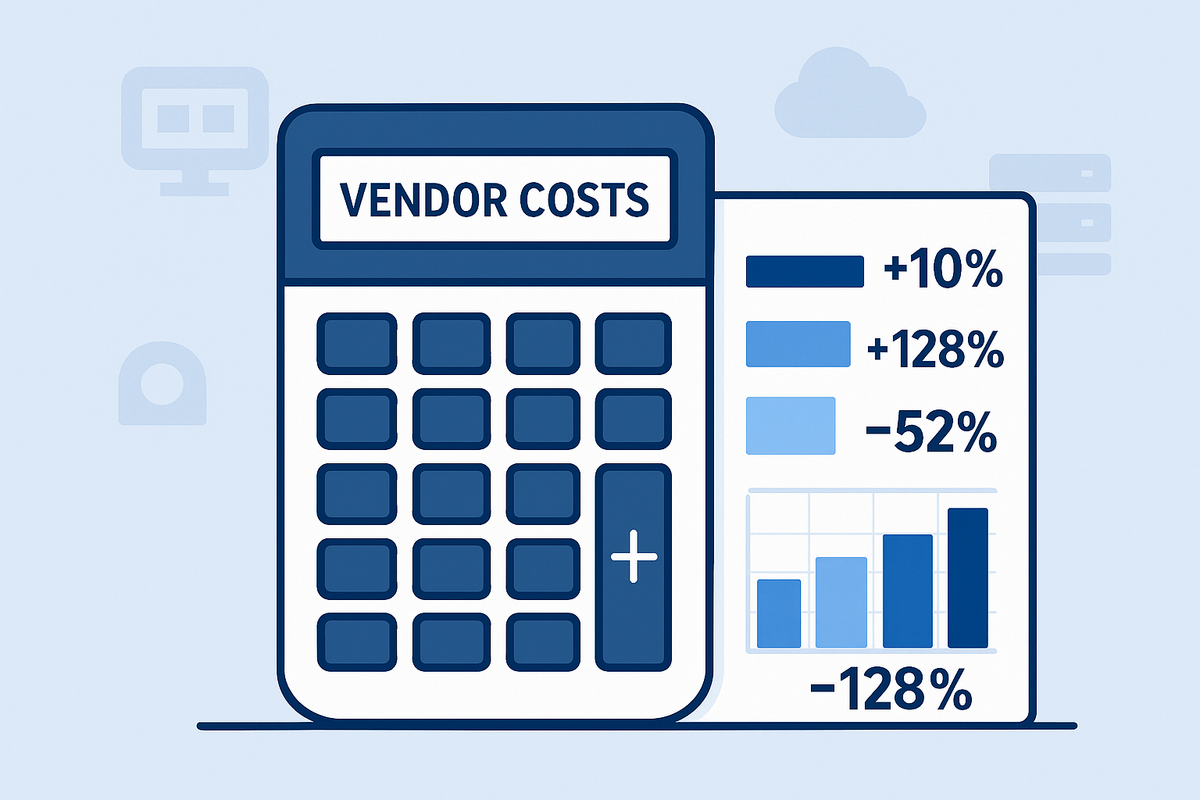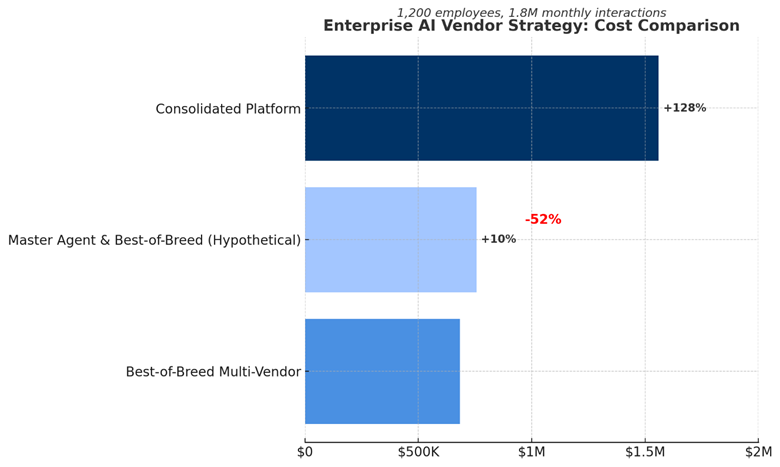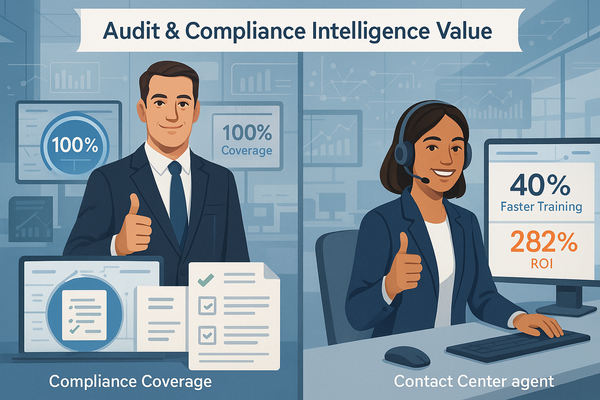Reality Check Wednesday: Enterprise AI Vendor ROI - Platform Integration vs. Best-of-Breed Math

Bold Enterprise Reality Statement: Enterprises pay 130% premiums for "one throat to choke" vendor consolidation, but 75% of organizations are pursuing vendor consolidation anyway. The math rarely works, but the operational pain of managing multiple vendors drives irrational buying decisions. Here's the real ROI breakdown - and a hypothetical solution that could change everything.
By the Enterprise Numbers: The Consolidation Tax
The Gartner Reality Check: Gartner found that 75% of organizations are pursuing security vendor consolidation in 2022, up from 29% in 2020, with enterprises willing to pay massive premiums to avoid vendor coordination complexity.
The Cost Structure Breakdown: Example: Mid-market financial services company, 1,200 employees, 1.8 million monthly customer interactions (mix of calls, chats, emails, and automated responses)
Separate Best-of-Breed Vendors:
- Voice AI (contact center): $22,000/month
- Analytics Platform (reporting/dashboards): $12,000/month
- Workflow Automation (case management): $18,000/month
- Total: $52,000/month ($624,000 annually)
"Integrated" All-in-One Platform:
- Comprehensive enterprise solution: $144,000/month (1,200 seats × $120/seat)
- Negotiated enterprise discount: -$14,400/month (10% discount)
- Final cost: $129,600/month ($1.56M annually)
- Premium: 149% markup for vendor simplicity
The Hidden Administrative Reality: A McKinsey report suggests that automation of vendor management tasks can lead to cost reductions of 30-50%, but most enterprises lack the systems to capture these efficiencies with multiple vendors.
Enterprise Success Story Deep Dive: The $936K Annual Consolidation Decision
A mid-market financial services company (1,200 employees, 1.8 million monthly customer interactions) faced a classic vendor decision: maintain five specialized AI vendors or consolidate to an integrated platform.
The Best-of-Breed Option:
- Combined vendor costs: $624,000 annually
- Internal management overhead: $60,000 annually (0.4 FTE IT staff for vendor coordination)
- Total cost: $684,000/year
The Consolidation Choice:
- Integrated platform: $1.56M annually (1,200 seats × $120/seat after discount)
- Simplified vendor management: Single contract, support, integration
- Final cost: $1.56M/year
- Premium paid: $876,000 annually (128% markup)
Why They Chose Consolidation: IT Director's explanation: "When something breaks at 2 AM, I need one phone number to call, not five different vendors pointing fingers at each other."
The Business Reality: Consolidating vendors strengthens negotiation leverage, allowing companies to secure more favorable terms in areas like pricing, service levels, and contracts - but only after accepting initial premium pricing.
Platform Failure Analysis: When Consolidation Backfires
The $1.8M Integration Disaster: A mid-market healthcare company (1,200 employees, 1.8 million monthly patient interactions) consolidated six point solutions into a single enterprise platform, expecting simplicity.
Original Multi-Vendor Costs:
- Six specialized vendors: $45,000/month combined
- Vendor management overhead: $8,000/month (additional IT resources)
- Total: $53,000/month ($636,000 annually)
Consolidation Attempt:
- Single enterprise platform: $85,000/month
- Implementation costs: $300,000 one-time
- Total first-year cost: $1.32M
Failure Points:
- Vendor lock-in discovery: Limited ability to negotiate after full migration
- Performance degradation: 25% slower response times vs. specialized tools
- Integration complexity: $180,000 additional consulting required
- Rollback costs: $180,000 to unwind and return to multi-vendor approach
The Reality: 40% of vendor consolidation projects require partial rollback within 18 months due to performance or cost issues.
The Hypothetical Master Agent Solution
Disclaimer: This is a conceptual framework. Actual implementation costs and results would vary significantly based on organization size, technical complexity, and vendor relationships.
The Theory: What if enterprises could keep best-of-breed vendors while eliminating vendor management complexity through AI orchestration?
Theoretical Cost Structure: Same example: 800-employee company, 25,000 monthly interactions
- Best-of-breed vendors: $35,000/month
- Master Agent platform (hypothetical): $5,000/month
- Internal monitoring setup: $2,000/month (0.1 FTE)
- Total: $42,000/month vs. $75,000 integrated platform
- Savings: $33,000/month (44% cost reduction)
Potential Benefits (Theoretical):
- Real-time vendor accountability with objective performance data
- Automated root cause analysis eliminating "not our fault" scenarios
- Data-driven vendor negotiations based on actual SLA performance
- Maintain best-of-breed performance while achieving operational simplicity
Vendor Red Flags Warning: Hidden Consolidation Costs
Watch for These Expensive Consolidation Traps:
- "Integration Included" Promises: Integration complexity can lead to significant costs in time and resources - always verify actual integration requirements
- Scope Creep During Implementation: Implementation costs can vary depending on the complexity, scope, and customization of the project
- Training and Change Management: Training costs can depend on the number, level, and location of the users and administrators
- Vendor Performance Degradation: Consolidated platforms often sacrifice specialized performance for integration convenience
Due Diligence Questions:
- What specific integrations are included vs. custom development required?
- How do individual module performances compare to specialized vendors?
- What are the true switching costs if consolidation doesn't deliver expected benefits?
- Can you maintain some vendor diversity for mission-critical functions?
The Strategic Decision Framework
Choose Vendor Consolidation When:
- IT team lacks bandwidth for multi-vendor management
- Integration complexity exceeds internal capabilities
- Regulatory compliance requires unified audit trails
- Premium cost is justified by risk reduction
Choose Best-of-Breed + Management System When:
- Performance requirements exceed integrated platform capabilities
- Cost optimization is primary objective
- Technical team can manage vendor coordination
- Business processes require specialized functionality
The Hybrid Approach (Recommended):
- Core platform for 70% of functionality
- Specialized vendors for mission-critical capabilities
- Automated monitoring system for vendor accountability
- Data-driven vendor performance management
What This Means for Your Vendor Strategy
The ROI Reality: A multinational corporation reported a 15% reduction in labor costs within the first year of implementing a VMS, attributed to more competitive vendor rates and reduced administrative overhead. Similar results are achievable with AI vendor management.

The Bottom Line: Vendor consolidation premiums are often justified by operational simplicity, but enterprises should calculate the true cost of convenience. Providing a centralized platform for managing vendors can enhance workflow efficiency, including quicker vendor onboarding, improved communication, and streamlined processes.
Strategic Recommendations:
- Calculate Total Cost of Ownership: Include hidden administrative costs in vendor comparisons
- Pilot Before Consolidating: Test integrated platforms against current best-of-breed performance
- Maintain Negotiation Leverage: Avoid complete vendor lock-in where possible
- Invest in Vendor Management: Whether through consolidation or automation, eliminate finger-pointing scenarios
The market pays premium prices for vendor simplicity, but the smartest enterprises will find ways to achieve operational efficiency without sacrificing performance or cost optimization. The future belongs to organizations that can manage vendor complexity intelligently, not those who simply pay to make it disappear.
Sources and References:
[1] Gartner Survey Shows 75% of Organizations Are Pursuing Security Vendor Consolidation in 2022, Gartner, September 12, 2022
[2] What benefits have you seen from vendor consolidation?, Gartner Peer Community, 2024
[3] Enterprise Vendor Management Software and Features to Prioritise in 2025, Gatekeeper, February 12, 2025
[4] IT Vendor Management Best Practices to Cut Costs, NPI, 2024
[5] How Much Does a Vendor Management System (VMS) Cost?, Conexis, 2024
[6] The ROI of Vendor Management Systems in Labor Cost Reduction, Anserteam, April 12, 2024
[7] Vendor Management Software: What's the Cost & ROI?, Conexis, January 9, 2024



